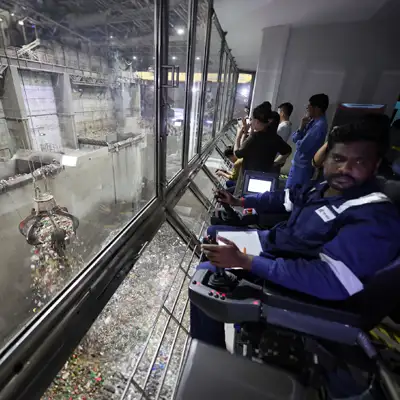As the global race to develop sustainable solutions heats up to advance a circular economy, Singapore finds itself with an enviable opportunity to take a leadership role.
As our team has sourced more than 300 investment opportunities and invested more than $40m in solutions to combat plastic waste and advance the circular economy, we believe Singapore has the ideal conditions to catalyze a reconfiguration of global supply chains and become a resilience hub for advanced manufacturing.
This is excellent news for Singapore as we seek new engines to drive economic growth; it is also excellent news for the circular economy.
As a result of these actions, Singapore has the building blocks upon which it can create an advanced recycling infrastructure because:
Singapore has already established the fundamentals by putting in place several critical factors: government and private sector commitments, an enabling policy environment, a strong collection system and a trusted ecosystem, to name a few.
● Individual solutions are now strengthened within the context of the whole system improving;
● Waste management operators are transitioning from slow growth models to entrepreneurial mindsets, supported by the ambitious plans of building Singapore as a digital innovation anchor; and
● An institutional policy framework can be leveraged to demonstrate the role of circular plastics in creating healthy cities.
Three Investment Interventions that Can Power Future Economic Growth
There are three specific areas of targeted investment which could have outsized impacts on the development of new, tech-enabled solutions that could add additional engines to Singapore’s economy while also driving significant impacts on improved recycling.
With relatively small amounts of investment, Singapore could catalyze $180 million in annual trade value.
Investment Intervention 1: Collection and Sorting and Infrastructure Boost
Small investments to improve sorting technology and increase the quality of collected recyclables will add 114,800 additional tonnes of recycling feedstock to the Singapore value chain. Such projects generally require $5-15m in capital, can create many dozens of jobs, and improve the economics for hundreds of other actors in the supply chain; that’s an incredible payoff.
Singapore recyclers are proactive and entrepreneurial having developed the existing recycling landscape, providing a solid foundation for growth. There are several quick wins that both recyclers and local companies can pursue that will complement upcoming Extended Producer Responsibility (EPR) and Deposit Return Scheme (DRS) policy interventions, as well as the Singapore Green Plan 2030:
- Implement plastic waste recycling targets for local operations. Companies can train their staff to identify plastics materials that can be recycled (e.g., unused hangers from retail apparel stores).
- Track plastic waste generation and end-of-use treatment of plastic waste. Better data is critical to reveal opportunities and challenges. Companies can collaborate with their recyclers to provide detailed breakdown and feedback about the recycling rates of their plastic waste to provide visibility on impacts of proactive recycling measures (e.g. improved segregation of materials).
- Develop partnerships between recyclers and companies. Recyclers can create more value by evolving from a commodity management solution to a service for close-loop plastic waste streams.
Investment Intervention 2: Deploy Upcycling Tech
Not all plastics can be readily recycled today and, after improving the fundamentals of collecting and sorting, Singapore can lead the deployment of new technology that would strengthen the local offtake market. This calls for investment in advanced recycling technologies and niche businesses for plastics that don’t have strong markets. Advanced recycling technologies should complement mechanical recycling solutions and be fit-for-local markets. Currently there are multiple pilot projects underway in Singapore that can provide detailed insights on technical suitability.
For example, one such project we looked at roughly needs a capital investment of $35M and would enable the processing of 10,000 tonnes per annum of contaminated plastic waste that could be used to create new, circular plastic or high-end markets such as BioStimulants.
Investment Intervention 3: Disruptive Innovation
In recent years, Singapore has become a hub for exciting ‘Food Tech’ businesses. Given its unique position in the global logistics chain, it could become the same thing for circular plastics. For example, some groups locally have proposed the creation of a Zero Plastic Waste Demonstrator to become a powerhouse innovator, radically changing plastic use alongside promoting decarbonization technology.
By investing in new collection and sorting capabilities that can leverage its uniquely strong consumer position, Singapore could become a trade hub in circular economy goods, services and systems.
Singapore is capable of becoming the region’s first location to test and deploy circular solutions across the value chain, from scaling new materials to reuse business models, in a real world learning environment.
Investment and Behavioral Change Go Hand in Hand
It is important to recognize that we cannot simply invest our way out of this challenge. The Ellen MacArthur Foundation and the Pew Charitable Trusts recently published research that finds we can only achieve systems change by combining behavioral interventions to reduce overall consumption alongside keeping products and materials in use. These combined interventions create the economic conditions that scale circular outcomes.
By pairing investments in Singapore’s infrastructure and innovation along with improved behavioral practices, Singapore can achieve its 2026 and 2030 Green Plan waste-to-landfill targets. And in the process, Singapore can become a model for how to invest successfully in recycling infrastructure to power new industries, new jobs and economic growth and point the way forward for solving the global plastic crisis.
This article was written by Rob Kaplan from Forbes and was legally licensed through the Industry Dive publisher network. Please direct all licensing questions to legal@industrydive.com.![]()







